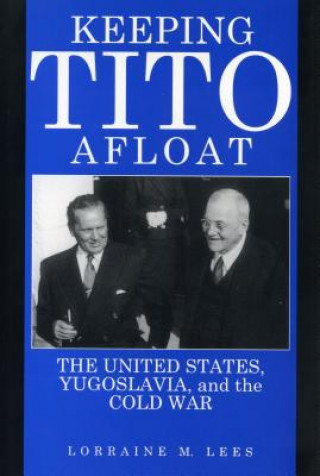
Code: 04563970
Keeping Tito Afloat
by Lorraine M. Lees
""Keeping Tito Afloat offers the most comprehensive treatment of U.S.-Yugoslav relations during the Cold War. Lees has an excellent feel for the development of policy within the American government, and she provides insightful ana ... more
- Language:
 English
English - Binding: Paperback
- Number of pages: 268
Publisher: Pennsylvania State University Press, 1997
- More about this

You might also like
-

Guardians of the Revolution
26.89 € -18 % -

Scandal in Kissing an Heir
10.22 € -4 % -

Doing Fieldwork
81.71 € -

Jericho
19.83 € -

Modern B-Tree Techniques
102.58 € -

Limits of Thought
203.33 €
Give this book as a present today
- Order book and choose Gift Order.
- We will send you book gift voucher at once. You can give it out to anyone.
- Book will be send to donee, nothing more to care about.
More about Keeping Tito Afloat
You get 113 loyalty points
 Book synopsis
Book synopsis
""Keeping Tito Afloat offers the most comprehensive treatment of U.S.-Yugoslav relations during the Cold War. Lees has an excellent feel for the development of policy within the American government, and she provides insightful analysis of the motives and actions of key people in the Truman and Eisenhower administrations. But the book is not simply focused on the U.S.; it offers valuable insight into Tito and his ability to resist American 'plans' for him.""-Wilson D. Miscamble, University of Notre Dame ""This account is the best single source on United States-Yugoslav relations during the Truman and Eisenhower years.""-Journal of American History Keeping Tito Afloat draws upon newly declassified documents to show the critical role that Yugoslavia played in U.S. foreign policy with the communist world in the early years of the Cold War. After World War II, the United States considered Yugoslavia to be a loyal Soviet satellite, but Tito surprised the West in 1948 by breaking with Stalin. Seizing this opportunity, the Truman administration sought to ""keep Tito afloat"" by giving him military and economic aid. President Truman hoped that American involvement would encourage other satellites to follow Tito's example and further damage Soviet power. However, Lees demonstrates that it was President Eisenhower and Secretary of State John Foster Dulles who most actively tried to use Tito as a ""wedge"" to liberate the Eastern Europeans. By the end of 1958, Eisenhower and Dulles discontinued this ""wedge strategy"" because it raised too many questions about the ties that should exist between communist, non-communist, and neutral states. As Tito shrewdly kept the U.S. at arm's length, Eisenhower was forced to accept Tito's continued absence from the Soviet orbit as victory enough. In the period between 1958 and 1960, Lees examines U.S. political objectives that remained after military support for Tito was discontinued. Although use of Yugoslavia as a wedge never fully succ
 Book details
Book details
Book category Books in English Society & social sciences Politics & government International relations
45.71 €
- Full title: Keeping Tito Afloat
- Author: Lorraine M. Lees
- Language:
 English
English - Binding: Paperback
- Number of pages: 268
- EAN: 9780271026503
- ISBN: 0271026502
- ID: 04563970
- Publisher: Pennsylvania State University Press
- Weight: 408 g
- Dimensions: 154 × 229 × 24 mm
- Date of publishing: 15. April 1997
Trending among others
-

Diplomacy
16.36 € -26 % -

Oxford Handbook of the Use of Force in International Law
69.34 € -

Gideon's Spies
25.56 € -28 % -

Prisoners of Geography
10.83 € -25 % -

World Order
11.34 € -24 % -

On Palestine
10.63 € -21 % -

Grand Chessboard
21.57 € -

Clash of Civilizations and the Remaking of World Order
16.76 € -18 % -

Who Rules the World?
14.21 € -

Tragedy of Great Power Politics
21.47 € -10 % -

Lords of the Desert
10.42 € -28 % -

Rethinking Fiscal Policy after the Crisis
148.30 € -

Hundred-Year Marathon
15.54 € -27 % -

Who Rules the World?
11.24 € -25 % -

Legacy of Ashes
17.89 € -16 % -

Adults In The Room
13.08 € -25 % -

Righteous Victims
20.45 € -19 % -

Tao Of Spycraft
38.45 € -

America's Secret War
14.92 € -14 % -

African Politics: A Very Short Introduction
9.40 € -28 % -

Cold War
16.87 € -24 % -

PostCapitalism
10.93 € -24 % -

Chasing the Flame
16.56 € -23 % -

Drone Theory
9.40 € -28 % -

Understanding International Relations
44.89 € -14 % -

Geopolitics and Geoculture
27.71 € -18 % -

Writer, Sailor, Soldier, Spy
17.07 € -6 % -

Governing the World
14.41 € -23 % -

Romania and the European Union
36.81 € -

Chaos in the Liberal Order
25.25 € -24 % -

Science Diplomacy: New Day Or False Dawn?
122.63 € -

Experts' Guide to International Protocol
71.38 € -9 % -

Human Rights and European Law
87.95 € -

Rise and Kill First
16.46 € -24 % -

Dead Aid
16.66 € -9 % -

Evolution of Cooperation
19.12 € -

The Spy and the Traitor
10.73 € -26 % -

World Order
16.46 € -23 % -

Countdown to Zero Day
16.87 € -17 % -

Political Order and Political Decay
15.23 € -23 % -

Strategic Vision
14.82 € -27 % -

PEACE TO END ALL PEACE
20.75 € -23 % -

Naked Diplomat
13.49 € -28 % -

Planetary Cycles Mundane Astrology
19.32 € -

After the Empire
15.23 € -

Understanding the Intelligence Cycle
68.83 € -

My Nationalist Pony
32.21 € -

Revenge of Geography
18.40 € -21 % -

Oxford IB Diploma Programme: Global Politics Course Book
65.14 €
Collection points Bratislava a 2642 dalších
Copyright ©2008-24 najlacnejsie-knihy.sk All rights reservedPrivacyCookies



 15549 collection points
15549 collection points Delivery 2.99 €
Delivery 2.99 € 02/210 210 99 (8-15.30h)
02/210 210 99 (8-15.30h)